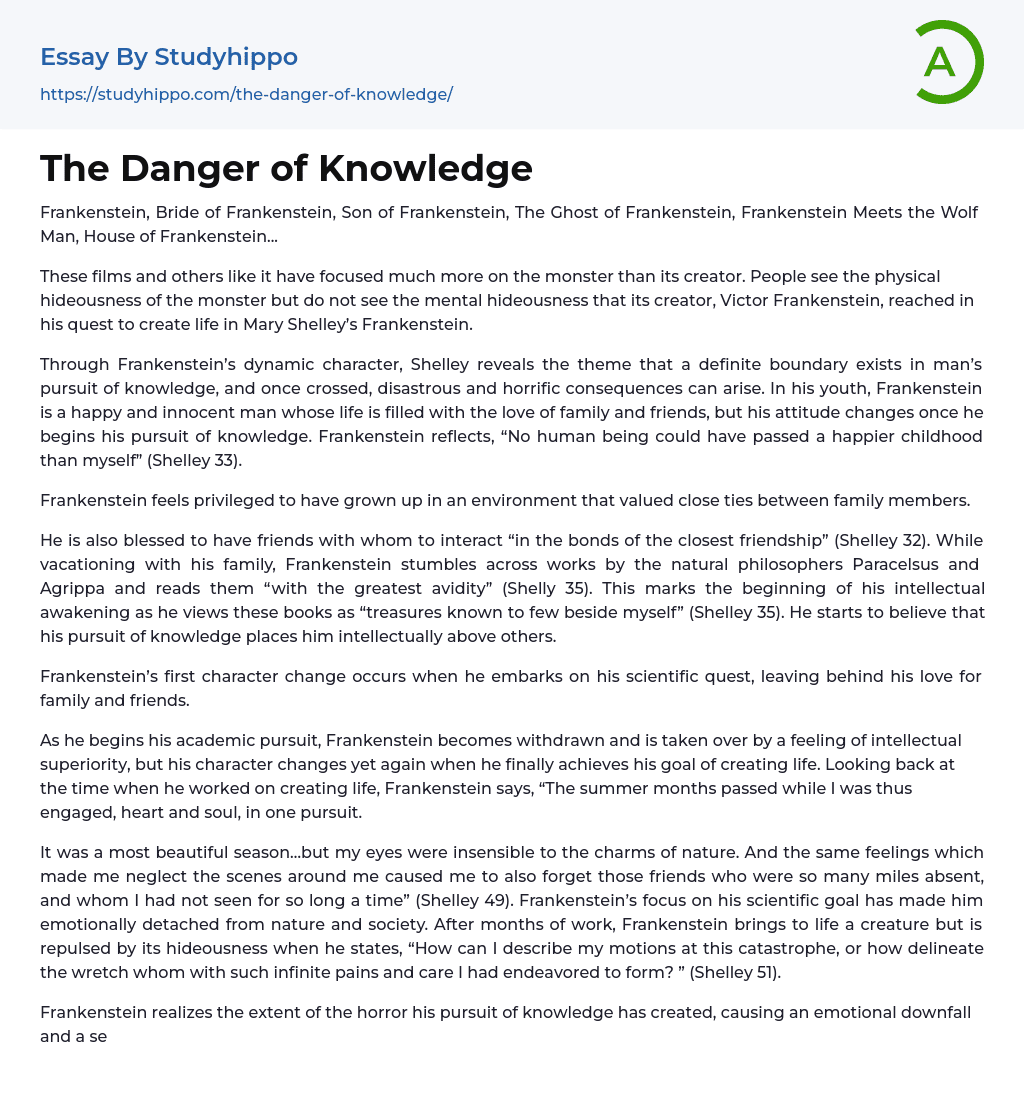Mary Shelley's Frankenstein and its subsequent movies, such as Bride of Frankenstein, Son of Frankenstein, The Ghost of Frankenstein, and Frankenstein Meets the Wolf Man, all focus on the monstrous creature rather than its creator. Despite the physical ugliness of the monster, people fail to recognize the mental monstrosity reached by Victor Frankenstein as he strives to create life. Shelley portrays through Frankenstein's character that a boundary exists in man's pursuit of knowledge. Once crossed, it can result in disastrous consequences. In his youth, Frankenstein is content and joyful surrounded by his family and friends. However, once he begins his pursuit of knowledge and comes across works by natural philosophers Paracelsus and Agrippa while on vacation with his family, his attitude changes. He views these books as treasures and begins to awaken intellectually.
Frankenstein experiences a cha
...nge in character when he sets out on a scientific quest, forsaking familial love for knowledge. Along the way, Frankenstein becomes withdrawn and feels intellectually superior to others. However, his character undergoes a transformation once again when he accomplishes his objective of creating life. Reflecting on his work towards this goal, Frankenstein remarks on the beauty of the season but admits to being emotionally disconnected from nature and distant from absent friends. He achieves his aim after months of toil, only to be repulsed by the hideousness of the creature he brought to life. Frankenstein begins to comprehend the horror his pursuit has wrought, resulting in an emotional decline and another shift in character.The emotionally devastated Frankenstein witnesses the miserable consequences caused by his creation, illustrating the recurring theme that exceeding boundaries in man's pursuit of knowledge can resul
in catastrophic and horrific outcomes. Frankenstein's loved ones, including his brother William, wife Elizabeth, and best friend Henry Clerval, suffer greatly at the hands of his monster, leading him to declare "no creature had ever been so miserable as I was" (Shelley 175). His prior intellectual pride gives way to feelings of worthlessness and depression as his character undergoes a tumultuous journey from excitement to disappointment. The scientist's quest for creating life initially feeds his sense of superiority and confidence, but his hubris ultimately leads to disastrous personal and societal consequences, proving that playing God has serious ramifications. Shelley effectively employs Frankenstein's development as a dynamic character to support the theme that negative repercussions ensue when humans exceed certain boundaries in their pursuit of knowledge.
There are those who believe that science, particularly in the areas of genetics and biomedical engineering, should have no limits. However, Shelley's Frankenstein serves as a warning of the consequences that come with disregarding ethical boundaries and adopting a "God-like" demeanor in scientific pursuits. Therefore, one must exercise caution and always acknowledge that it is only God who truly creates and grants life.
- 1984 essays
- A Farewell to Arms essays
- A Good Man Is Hard to Find essays
- A Hanging essays
- A Lesson Before Dying essays
- A Long Way Gone essays
- A Rose For Emily essays
- A Separate Peace essays
- A Tale Of Two Cities essays
- A Very Old Man With Enormous Wings essays
- Adventures Of Huckleberry Finn essays
- Alice in Wonderland essays
- All Quiet on The Western Front essays
- Allegory of the Cave essays
- An occurrence at owl creek bridge essays
- Animal Farm essays
- Anthem essays
- Antigone essays
- Arthur Conan Doyle essays
- As I Lay Dying essays
- Atticus Finch essays
- Barn Burning essays
- Battle Royal essays
- Beauty and The Beast essays
- Beloved essays
- Boo Radley essays
- Brave New World essays
- Candide essays
- Castle essays
- Characters In Hamlet essays
- Characters In Romeo And Juliet essays
- Christmas carol essays
- Chronicle of a Death Foretold essays
- Cinderella essays
- Crime and Punishment essays
- Daisy Miller essays
- Death of a Salesman American Dream essays
- Desdemona essays
- Diary Of A Wimpy Kid essays
- Dracula essays
- Dubliners essays
- Emma essays
- Ender'S Game essays
- Ethan Frome essays
- Eveline essays
- Fahrenheit 451 essays
- First-Person Narrative essays
- Fish Cheeks essays
- Frankenstein essays
- Genesis essays




